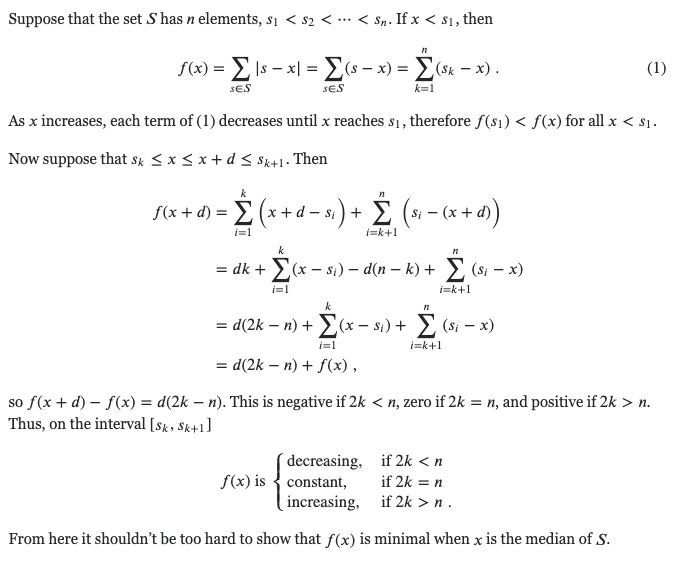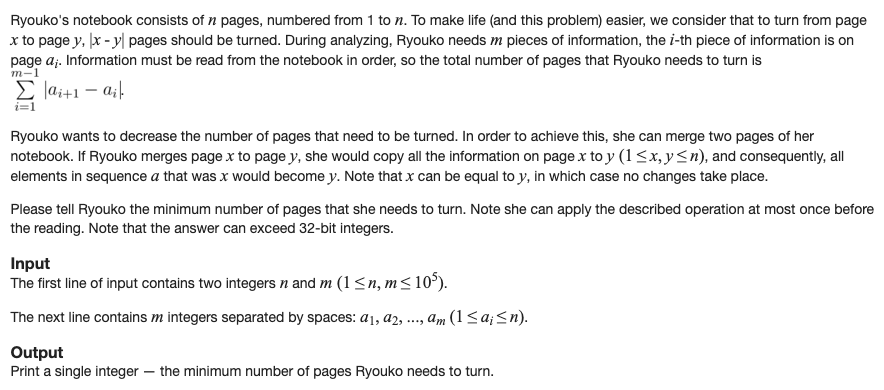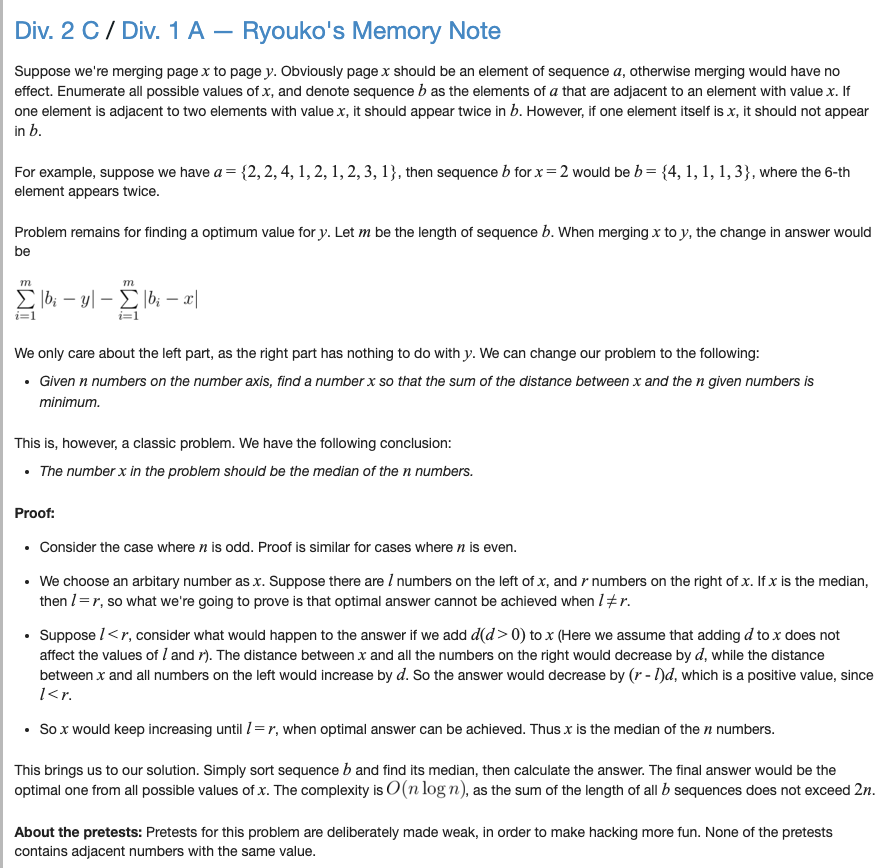Notes
L1 norm: Suppose we have a set 𝑆 of real numbers. Show that ∑ 𝑠 ∈ S | 𝑠 − 𝑥 | is minimal if x is equal to the median.

Applications:

Solution:

#include <cstdio>
#include <iostream>
#include <algorithm>
#include <vector>
using namespace std;
typedef long long ll;
#define N 100000
int n, m, a[N + 1];
vector <int> b[N + 1];
int main(int argc, char *argv[]) {
ios :: sync_with_stdio(false);
cin >> n >> m;
for (int i = 1; i <= m; ++i) cin >> a[i];
for (int i = 1; i <= m; ++i) {
if (i > 1 && a[i - 1] != a[i]) b[a[i - 1]].push_back(a[i]);
if (i < m && a[i + 1] != a[i]) b[a[i + 1]].push_back(a[i]);
}
ll ans = 0LL, sum = 0LL;
for (int i = 1; i <= n; ++i) {
if (!b[i].size()) continue;
sort(b[i].begin(), b[i].end());
int y = b[i][b[i].size() >> 1];
ll before = 0LL, after = 0LL;
for (int j = 0; j < b[i].size(); ++j) {
before += abs(i - b[i][j]);
after += abs(y - b[i][j]);
}
ans = max(ans, before - after), sum += before;
}
cout << sum / 2 - ans << endl;
fclose(stdin);
fclose(stdout);
return 0;
}
source: https://codeforces.com/contest/433/submission/6712939
Count of Subarrays with Median
https://leetcode.com/contest/weekly-contest-321/problems/count-subarrays-with-median-k/
However 'k' is index and 1 <= k <= n where n is length of array.
We have to find how many subarrays have arr[k] as median, also subarray has to be odd length. This is the only hint we need.
Since subarrays are odd length it can be (arr[k]) or (1 element on left and right), (2 elements on left and right), so on...
We can maintain smaller and bigger arrays of length n and populate them as follows:
if(arr[i] < arr[k])
smaller[i] = 1;
else
smaller[i] = 0;
for bigger elements than arr[k]:
if(arr[i] > arr[k])
bigger[i] = 1;
else
bigger[i] = 0;
This helps us to find in range i...j where i <= j, count of smaller and bigger elements with respect to arr[k].
For arr[k] to be median in the range [i,j], The following condition has to hold.
Prefix Sum(smaller[j] - smaller[i - 1]) = Prefix Sum(bigger[j] - bigger[i - 1])
In other words difference between a number of smaller and bigger elements in the range [i, j] is 0.
we create new array d of length n, such that
d[i] = smaller[i] - bigger[i]
Now problem reduces to finding the number of subarrays having a sum of 0;
But not all subarrays having sum 0 are useful to us. We don't care about the subarrays that do not include k. So,
ans = subarray_sum_zero(1, n, d) - subarray_sum_zero(1, k - 1, d) - subarray_sum_zero(k + 1, n, d)
subarray_sum_zero function finds the number of subarrays in array d. You can find the subarray sum equals k using the map in linear time complexity.
overall runtime complexity is O(n) and space complexity is O(n). It should be able pass the tests n = 1e5.
The following solution handles for even number too.
class Solution {
public:
vector<int> V;
long long subsum(int start, int end){
map<int, int> M;
int rSum = 0;
long long res = 0;
for(int i=start;i<end;i++){
rSum += V[i];
if(rSum == 0 || rSum == 1) res++;
res += M[rSum];
res += M[rSum - 1];
M[rSum]++;
}
return res;
}
int countSubarrays(vector<int>& nums, int k) {
int n = nums.size(), id = -1;
vector<int> small(n), big(n);
V = vector<int>(n);
for(int i=0;i<n;i++){
V[i] = (nums[i] > k) - (nums[i] < k);
if(nums[i] == k) id = i;
}
return subsum(0, n) - subsum(0, id) - subsum(id+1, n);
}
};